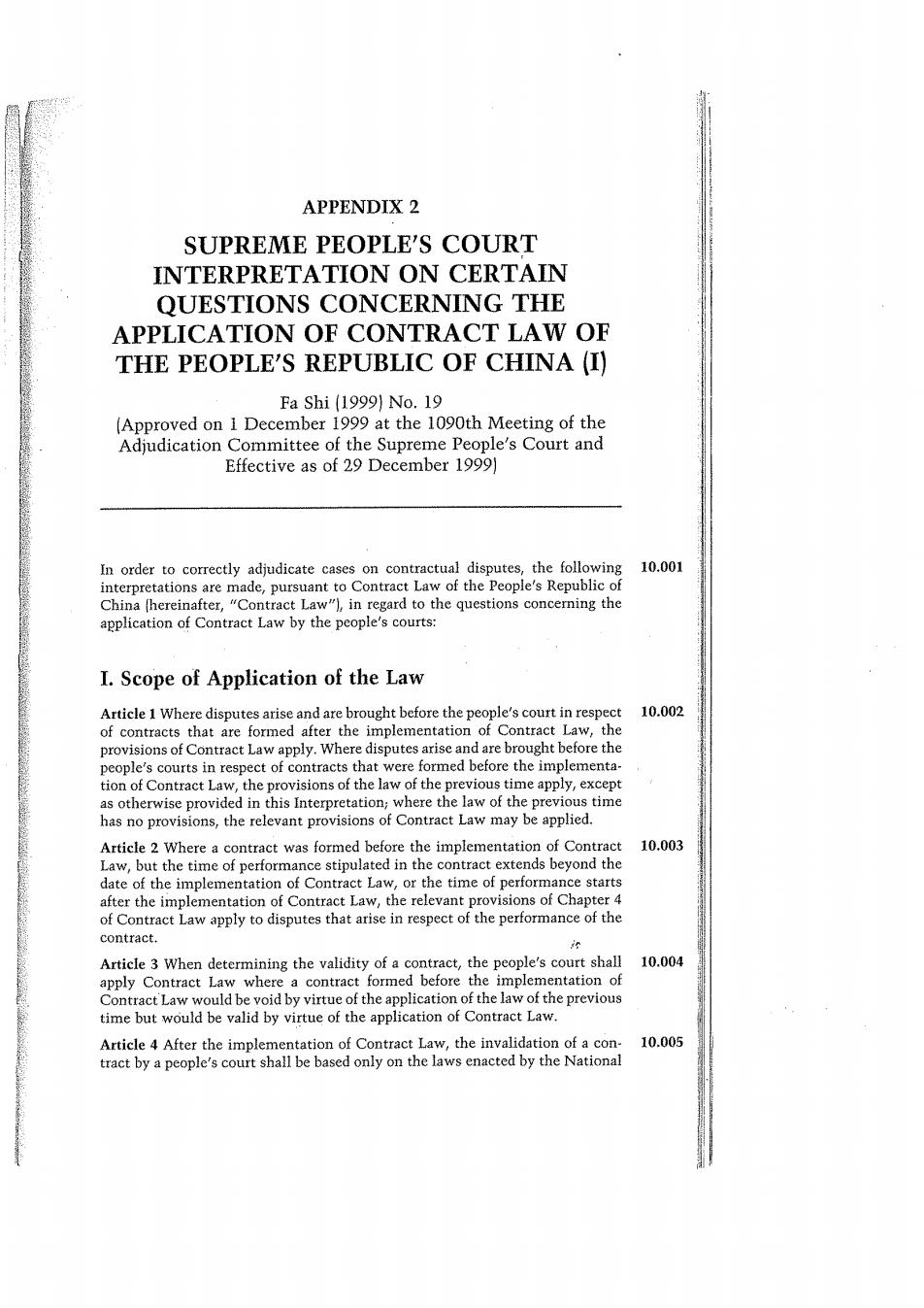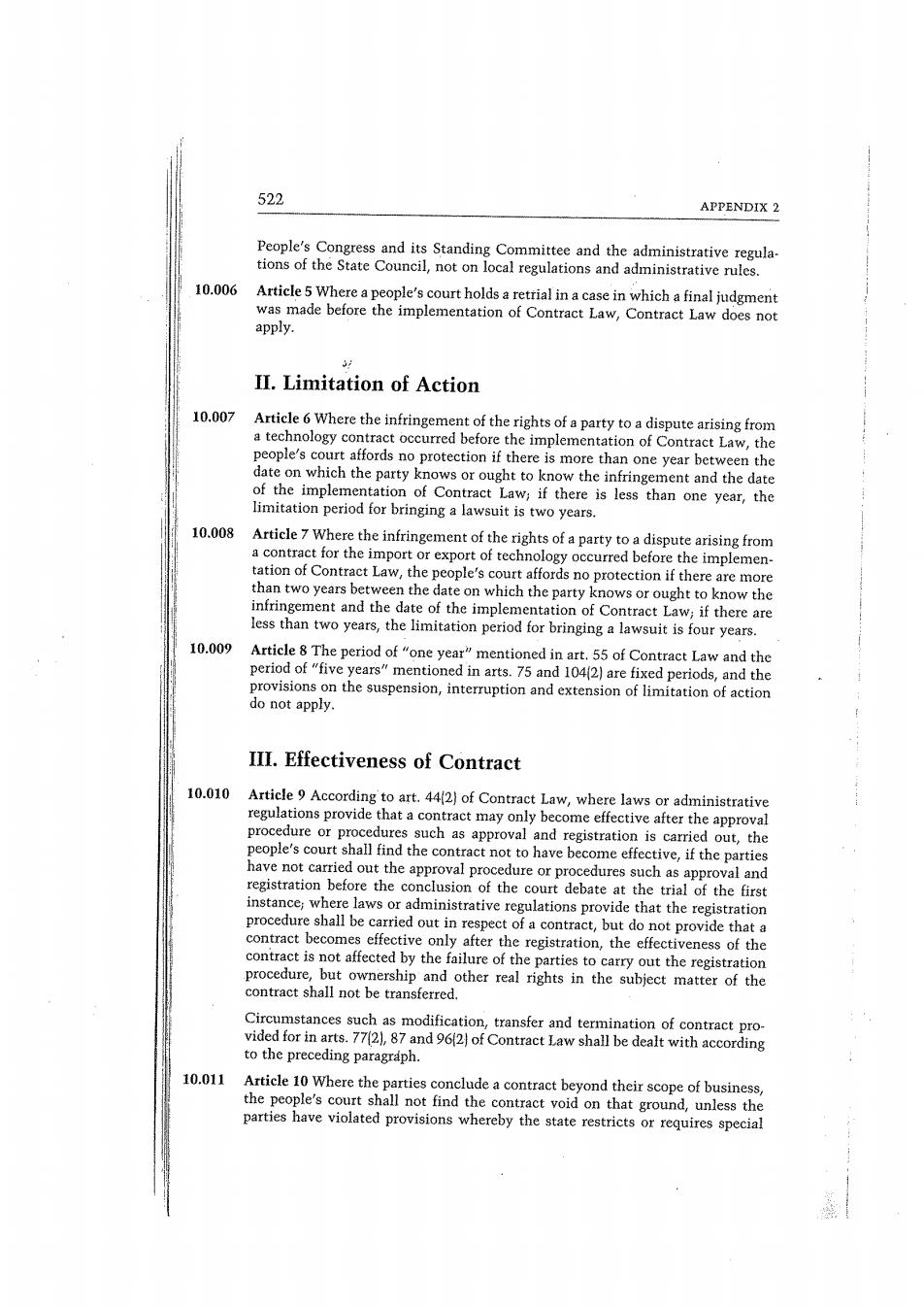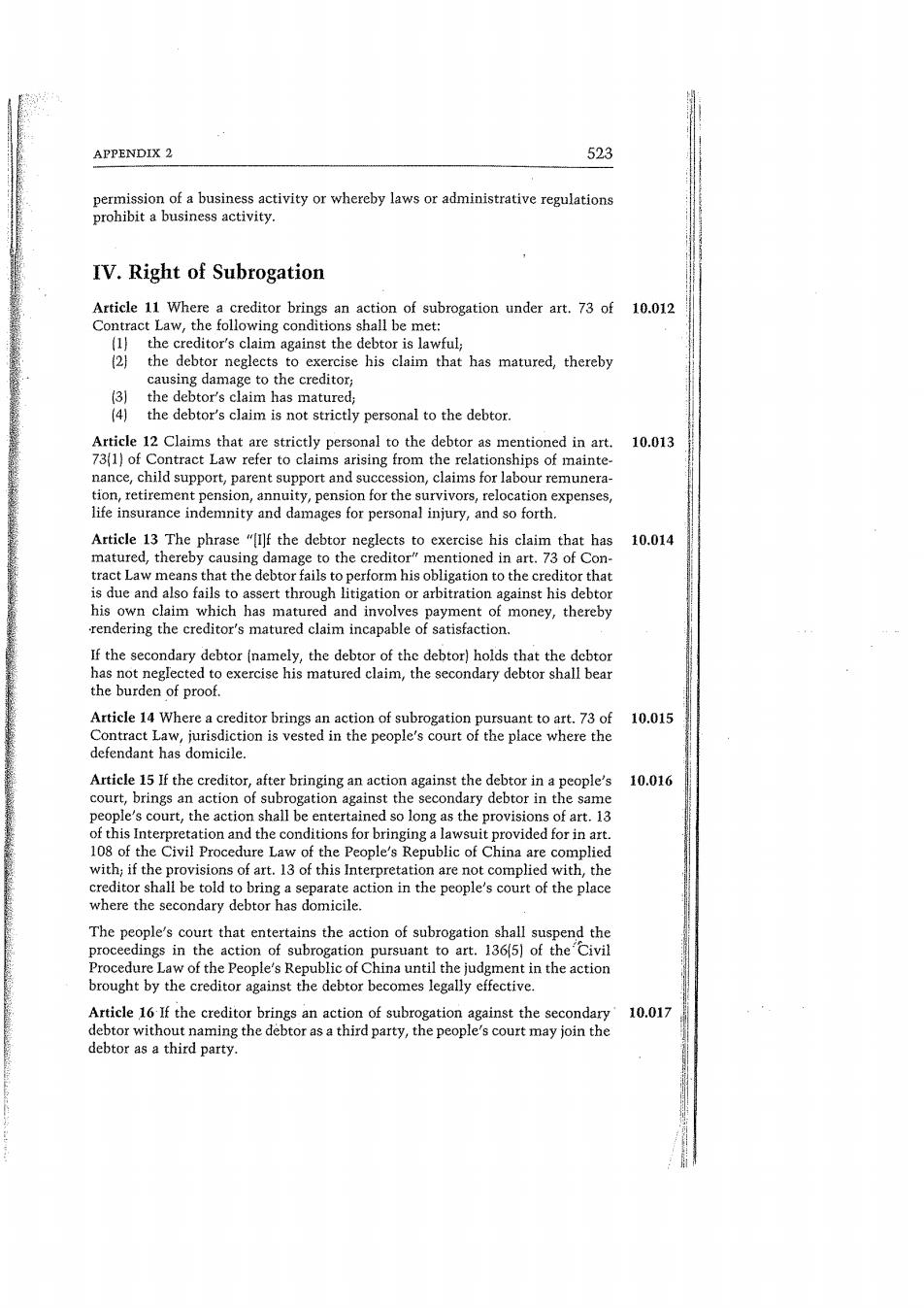
APPENDIX 2 SUPREME PEOPLE'S COURT INTERPRETATION ON CERTAIN QUESTIONS CONCERNING THE APPLICATION OF CONTRACT LAW OF THE PEOPLE'S REPUBLIC OF CHINA (I) Fa Shi (1999)No.19 (Approved on 1 December 1999 at the 1090th Meeting of the Adjudication Committee of the Supreme People's Court and Effective as of 29 December 1999) In order to correctly adjudicate cases on contractual disputes,the following 10.001 interpretations are made,pursuant to Contract Law of the People's Republic of China [hereinafter,"Contract Law"),in regard to the questions concerning the application of Contract Law by the people's courts: I.Scope of Application of the Law Article 1 Where disputes arise and are brought before the people's court in respect 10.002 of contracts that are formed after the implementation of Contract Law,the provisions of Contract Law apply.Where disputes arise and are brought before the people's courts in respect of contracts that were formed before the implementa tion of Contract Law,the provisions of the law of the previous time apply,except as otherwise provided in this Interpretation;where the law of the previous time has no provisions,the relevant provisions of Contract Law may be applied. Article 2 Where a contract was formed before the implementation of Contract 10.003 Law,but the time of performance stipulated in the contract extends beyond the date of the implementation of Contract Law,or the time of performance starts after the implementation of Contract Law,the relevant provisions of Chapter 4 of Contract Law apply to disputes that arise in respect of the performance of the contract. Article 3 When determining the validity of a contract,the people's court shall 10.004 apply Contract Law where a contract formed before the implementation of Contract Law would be void by virtue of the application of the law of the previous time but would be valid by virtue of the application of Contract Law. Article 4 After the implementation of Contract Law,the invalidation of a con- 10.005 tract by a people's court shall be based only on the laws enacted by the National

522 APPENDIX 2 People's Congress and its Standing Committee and the administrative regula- tions of the State Council,not on local regulations and administrative rules. 10.006 Article 5 Where a people's court holds a retrial in a case in which a final judgment was made before the implementation of Contract Law,Contract Law does not apply. II.Limitation of Action 10.007 Article 6 Where the infringement of the rights of a party to a dispute arising from a technology contract occurred before the implementation of Contract Law,the people's court affords no protection if there is more than one year between the date on which the party knows or ought to know the infringement and the date of the implementation of Contract Law;if there is less than one year,the limitation period for bringing a lawsuit is two years. 10.008 Article 7 Where the infringement of the rights of a party to a dispute arising from a contract for the import or export of technology occurred before the implemen- tation of Contract Law,the people's court affords no protection if there are more than two years between the date on which the party knows or ought to know the infringement and the date of the implementation of Contract Law;if there are less than two years,the limitation period for bringing a lawsuit is four years. 10.009 Article 8 The period of "one year"mentioned in art.55 of Contract Law and the period of "five years"mentioned in arts.75 and 104(2)are fixed periods,and the provisions on the suspension,interruption and extension of limitation of action do not apply. III.Effectiveness of Contract 10.010 Article 9 According to art.442)of Contract Law,where laws or administrative regulations provide that a contract may only become effective after the approval procedure or procedures such as approval and registration is carried out,the people's court shall find the contract not to have become effective,if the parties have not carried out the approval procedure or procedures such as approval and registration before the conclusion of the court debate at the trial of the first instance;where laws or administrative regulations provide that the registration procedure shall be carried out in respect of a contract,but do not provide that a contract becomes effective only after the registration,the effectiveness of the contract is not affected by the failure of the parties to carry out the registration procedure,but ownership and other real rights in the subject matter of the contract shall not be transferred. Circumstances such as modification,transfer and termination of contract pro- vided for in arts.77(2),87 and 962)of Contract Law shall be dealt with according to the preceding paragraph. 10.011 Article 10 Where the parties conclude a contract beyond their scope of business, the people's court shall not find the contract void on that ground,unless the parties have violated provisions whereby the state restricts or requires special

APPENDIX 2 523 permission of a business activity or whereby laws or administrative regulations prohibit a business activity. IV.Right of Subrogation Article 11 Where a creditor brings an action of subrogation under art.73 of 10.012 Contract Law,the following conditions shall be met: (1 the creditor's claim against the debtor is lawful, 21 the debtor neglects to exercise his claim that has matured,thereby causing damage to the creditor, (3)the debtor's claim has matured, (4)the debtor's claim is not strictly personal to the debtor. Article 12 Claims that are strictly personal to the debtor as mentioned in art. 10.013 73(1)of Contract Law refer to claims arising from the relationships of mainte- nance,child support,parent support and succession,claims for labour remunera- tion,retirement pension,annuity,pension for the survivors,relocation expenses, life insurance indemnity and damages for personal injury,and so forth. Article 13 The phrase "If the debtor neglects to exercise his claim that has 10.014 matured,thereby causing damage to the creditor"mentioned in art.73 of Con- tract Law means that the debtor fails to perform his obligation to the creditor that is due and also fails to assert through litigation or arbitration against his debtor his own claim which has matured and involves payment of money,thereby rendering the creditor's matured claim incapable of satisfaction. If the secondary debtor (namely,the debtor of the debtor)holds that the debtor has not neglected to exercise his matured claim,the secondary debtor shall bear the burden of proof. Article 14 Where a creditor brings an action of subrogation pursuant to art.73 of 10.015 Contract Law,jurisdiction is vested in the people's court of the place where the defendant has domicile. Article 15 If the creditor,after bringing an action against the debtor in a people's 10.016 court,brings an action of subrogation against the secondary debtor in the same people's court,the action shall be entertained so long as the provisions of art.13 of this Interpretation and the conditions for bringing a lawsuit provided for in art. 108 of the Civil Procedure Law of the People's Republic of China are complied with;if the provisions of art.13 of this Interpretation are not complied with,the creditor shall be told to bring a separate action in the people's court of the place where the secondary debtor has domicile. The people's court that entertains the action of subrogation shall suspend the proceedings in the action of subrogation pursuant to art.136(5)of the'Civil Procedure Law of the People's Republic of China until the judgment in the action brought by the creditor against the debtor becomes legally effective. Article 16 If the creditor brings an action of subrogation against the secondary 10.017 debtor without naming the debtor as a third party,the people's court may join the debtor as a third party

524 APPENDIX 2 Where two or more creditors bring actions of subrogation against the same secondary debtor,the people's court may combine the proceedings. 10.018 Article 17 In an action of subrogation,if the creditor applies for preservation against the property of the secondary debtor,he shall provide appropriate real security. 10.019 Article 18 In an action of subrogation,the secondary debtor may invoke against the creditor the defences that he has against the debtor. If the debtor raises an objection to the claim of the creditor during an action of subrogation and if the objection is sustained after review,the people's court shall order a dismissal of the creditor's action. 10.020 Article 19 If the creditor prevails in the action of subrogation,the court costs shall be borne by the secondary debtor,and shall be paid on a priority basis from the satisfied claim 10.021 Article 20 If the right of subrogation is established after the action of subrogation brought by the creditor against the secondary debtor is tried by the people's court, the secondary debtor shall perform his duty of payment to the creditor,and the corresponding claims and obligations between the creditor and the debtor and between the debtor and the secondary debtor are thereupon extinguished. 10.022 Article 21 In an action of subrogation,if the amount of the claim of the creditor in exercising the right of subrogation exceeds the amount of the obligation owed by the debtor or exceeds the amount of the obligation owed by the secondary debtor to the debtor,the part in excess shall not be supported by the people's court. 10.023 Article 22 If,in an action of subrogation,the debtor brings an action against the secondary debtor in respect of the part of his claim in excess of the creditor's claim of subrogation,he shall be told by the people's court to bring a separate action in the competent people's court. If the action brought by the debtor complies with the legal conditions,the people's court shall entertain it;the people's court that entertains the debtor's action shall suspend the proceedings according to law until the judgment in the action of subrogation becomes legally effective. V.Right of Revocation 10.024 Article 23 Where a creditor brings an action of revocation pursuant to art.74 of Contract Law,jurisdiction is vested in the people's court of the place where the defendant has domicile. 10.025 Article 24 If the creditor brings an action of cancellation only against the debtor as the defendant without naming the beneficiary or the transferee as a third party, the people's court may join the beneficiary or the transferee as a third party. 10.026 Article 25 Where the creditor brings an action of revocation pursuant to art.74 of Contract Law and requests the people's court to revoke the debtor's act of waiving his claim or transferring his property,the people's court shall adjudicate

APPENDIX 2 525 the case in regard to the part for which the creditor asserts his right of revocation; if the act is revoked according to law,the act is void ab initio. If two or more creditors bring actions of revocation against the same debtor and in respect of the same subject matter,the people's court may combine the proceedings. Article 26 The necessary expenses disbursed by the creditor in exercising his 10.027 right of revocation,such as the attorney's fee and travel expenses,shall be borne by the debtor.If the third party is at fault,he shall bear an appropriate share of the same. VI.The Third Party in the Transfer of Contract Article 27 If,after the creditor assigns his contractual right,the debtor and the 10.028 assignee have a dispute over the performance of the contract and bring an action to a people's court,the creditor may be joined as a third party if the debtor invokes a defence against the creditor's right. Article 28 If,after the debtor transfers his contractual obligation with the consent 10.029 of the creditor,the transferee and the creditor have a dispute over the perform- ance of the contract and bring an action to a people's court,the debtor may be joined as a third party if the transferee invokes a defence in respect of the debtor's right against the creditor. Article 29 If,after a party to the contract transfers both his rights and obligations 10.030 under the contract to the transferee with the consent of the other party,the other party and the transferee have a dispute over the performance of the contract and bring an action to a people's court,the transferor may be joined as a third party if the other party invokes a defence in relation to the rights and obligations under the contract. VII.Concurrence of Claims Article 30 If the creditor,upon bringing an action in the people's court,makes the 10.031 choice pursuant to art.122 of Contract Law,but modifies his claim before the opening of the trial at the first instance,the people's court shall allow it;if the other party objects to the jurisdiction,the people's court shall dismiss the action if the obiection is sustained after review